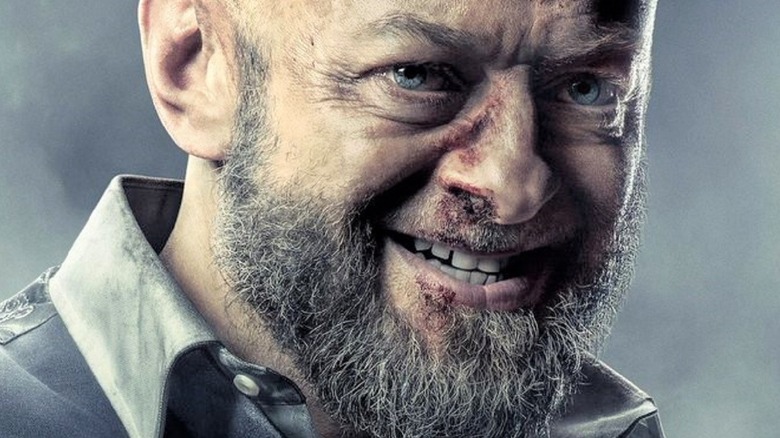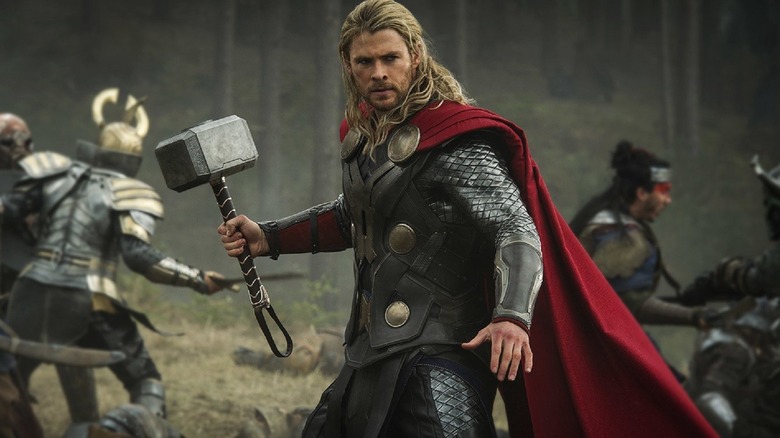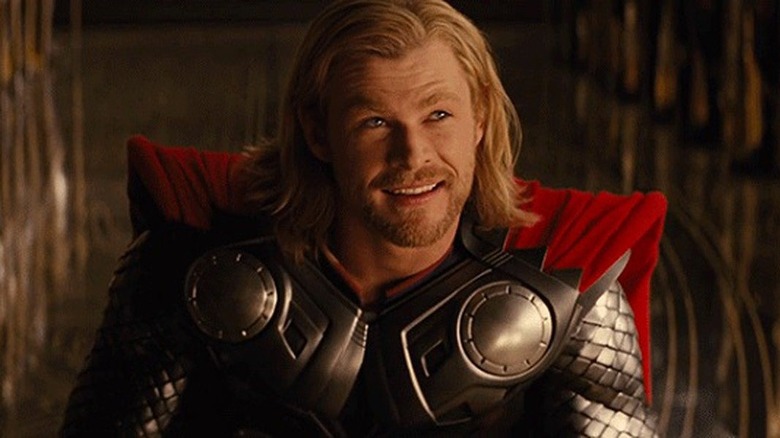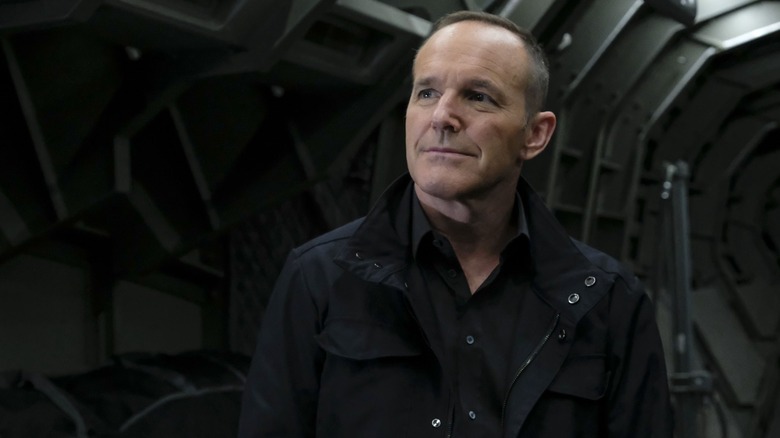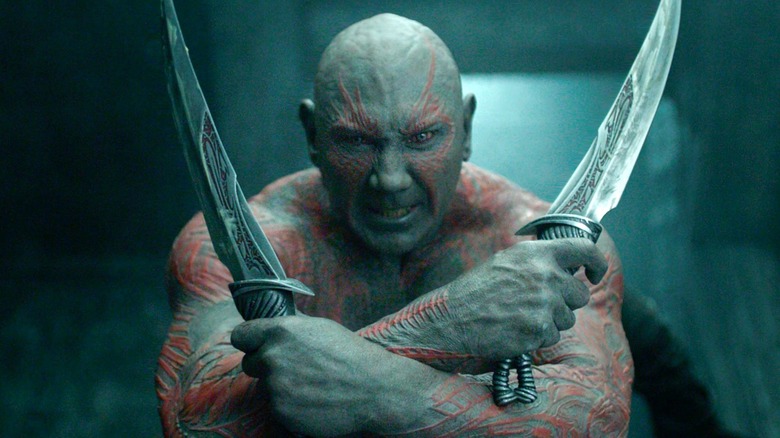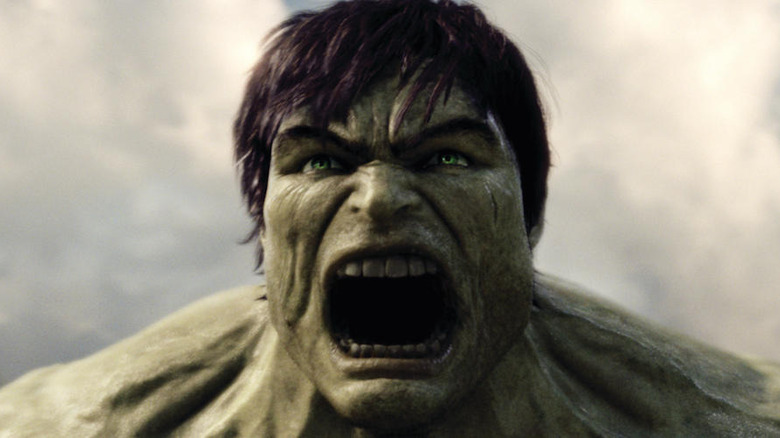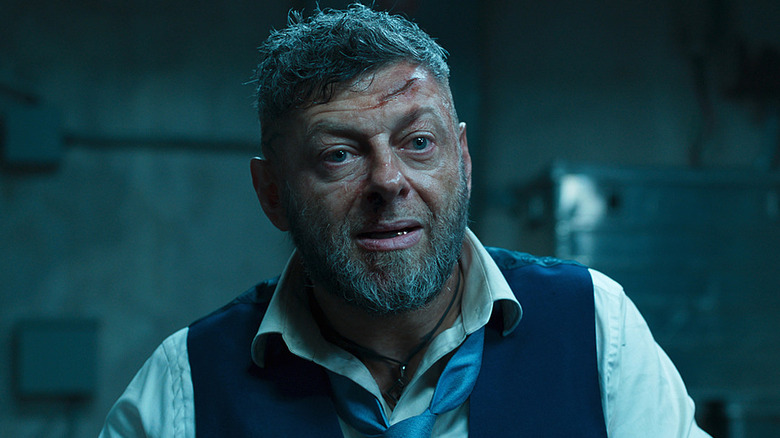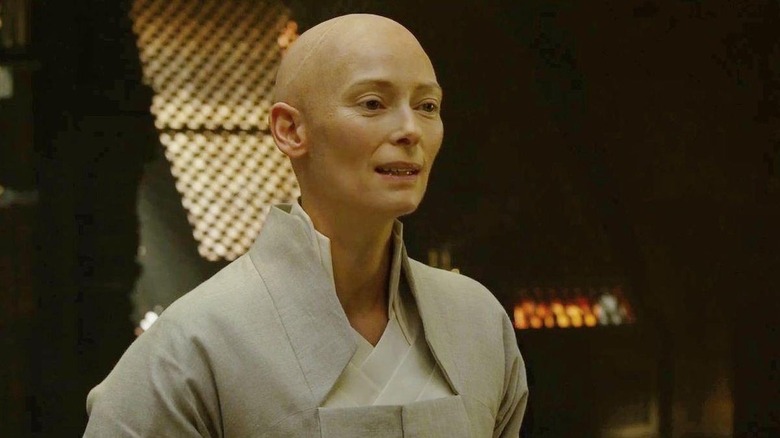Marvel's Biggest Regrets In The MCU
When looking at the Marvel Cinematic Universe as a whole, it's easy to perceive the franchise as being bulletproof. After all, this is the series that started out its existence by turning Iron Man from a B-list superhero into one of the most popular blockbuster characters of all time. From there, this interconnected series of motion pictures managed to work similar magic on the Guardians of the Galaxy and the Avengers, transforming these figures into household names. At the same time, the franchise has inspired a new way of producing big-budget features, all while consistently breaking box office records and even scoring a handful of Oscars along the way. In just over a decade, the Marvel Cinematic Universe has amassed a staggering amount of achievements. However, that doesn't mean this sprawling saga is devoid of missteps. Just ask the people in charge of these projects.
Marvel Studios higher-ups like Kevin Feige — as well as directors of individual MCU installments — would be the first to say that not every aspect of this franchise has been pulled off perfectly. Over the course of producing more than 20 movies and a handful of TV shows, some mistakes have, naturally, emerged. These range from unfortunate casting decisions and creative control issues to even explicit remorse about bringing dead characters back to life. Sure, the Marvel Cinematic Universe has been rife with successes, but that doesn't mean the people behind the franchise have had zero regrets over the course of bringing these films to life.
Alan Taylor regrets his Thor: The Dark World experience
"Thor: The Dark World" has not garnered the best reputation among MCU movies. Not only did it get the worst reviews of any feature in the franchise, but even its own director, Alan Taylor, has publicly expressed disappointment over how the project turned out. Specifically, Taylor — who's directed "Terminator Genisys" and worked on TV shows like "Mad Men," "Game of Thrones," and "The Sopranos" — has been pretty open about how he didn't end up having as much of a creative impact on the production as he wanted.
The first inkling of Taylor having a difficult experience on the project came up as early as October 2013, when Taylor, while promoting the theatrical release of "The Dark World," revealed that he and Marvel Studios had disagreements over how to deliver exposition throughout the movie. Taylor would get more explicit in later interviews, coming right out and saying that the final cut of the movie was different from what he initially wanted. "I've done two [blockbuster movies], and I've learned that you don't make a $170 million movie with someone else's money and not have to collaborate a lot," Taylor explained to Uproxx. "The Marvel experience was particularly wrenching because I was sort of given absolute freedom while we were shooting, and then in post, it turned into a different movie. So, that is something I hope never to repeat and don't wish upon anybody else."
No wonder "Thor: The Dark World" has generated the reputation it has, given that Taylor has so many obvious regrets about making it.
That decision to dye Chris Hemsworth's eyebrows
It took a few MCU appearances for the franchise to really get Thor right. "Thor: Ragnarok" solidified what this character was all about, but before then, the God of Thunder was on shakier ground. The character was a little more traditional in these initial outings, and he lacked the consistently engaging and subversive personalities that his fellow "Avengers" received. One of several ways Thor's earlier appearances came up short was in a tiny detail from the first "Thor" movie, one related to Chris Hemsworth's eyebrows. Yes, his eyebrows.
This revelation came directly from the president of Marvel Studios, Mr. Kevin Feige himself. "Definitively, the one thing I would definitely do differently if I had to do it over again is we would not have dyed Chris Hemsworth's eyebrows blond in the first Thor," Feige explained to Uproxx in 2018. "Because we were like, Thor is blond! He has to be blond! And Hemsworth was great and awesome and pulled it off, but there are a couple of shots I watch, and I'm like, 'Oh my God, that poor guy, we made him freaking dye his eyebrows! That's ridiculous!' And I can laugh about it now because Hemsworth is Thor, and he doesn't need long hair or a cape or a hammer or two eyeballs to be Thor." Thor's earliest MCU appearances reflected a character that was clearly a work in progress, but who knew this even boiled down to his eyebrows?
Joss Whedon had second thoughts about reviving Phil Coulson
Phil Coulson became such a beloved character during his time in the Marvel Cinematic Universe that many fans, upon seeing him perish at Loki's hand in "The Avengers," wanted nothing more than for him to return. Well, they got their wish and then some since Coulson was revealed to be alive and well on the ABC TV show "Agents of SHIELD." Co-created by "Avengers" director Joss Whedon, the decision to resurrect this character inspired as many fans as it did detractors, with skeptics opining that going down this route was a cheap storytelling ploy. Surprisingly, Whedon himself actually fell into the latter camp.
In the spring of 2015, Whedon told Mental Floss that bringing back Coulson removed "some of the punch out of [his death scene] for me." He then went on to say that the whole ordeal of reviving Coulson reflected some of his own issues with blockbuster storytelling. "But it's difficult because you're living in franchise world," Whedon explained, adding, "You can't kill anyone or anybody significant. ... I think it's disingenuous to say we're going to fight this great battle, but there's not going to be any loss. So my feeling in these situations with Marvel is that if somebody has to be placed on the altar and sacrificed, I'll let you guys decide if they stay there." While Coulson returning may have been a dream come true for some fans, for Whedon, it was a much more complicated experience that filled him with a lot of regret.
James Gunn regrets cutting out a bloodthirsty Drax line
When you're making a movie, you have to learn to kill your darlings. Your favorite moment in a feature can't overwhelm the importance of making sure the entire feature is running smoothly. Nobody knows this better than writer/director James Gunn, who's never been shy when it comes to talking about personal favorite scenes and lines that didn't make the final cut of his various directorial efforts. In terms of his first motion picture for the Marvel Cinematic Universe, he's openly talked about how one of his favorite Drax the Destroyer lines in "Guardians of the Galaxy" was omitted from the film's final cut.
The line in question is a follow-up to a discussion that was retained in the movie, in which Peter Quill notes that he comes from a planet of outlaws. Drax responds that this sounds like a place he'd like to explore, which inspires Peter to casually say that Drax should come and visit sometime. In the final cut, this is the end of their exchange. However, originally, Drax also noted that while he was on Earth, he would like to "kill many people there." The brutal joke ended up on the cutting room floor, but Gunn loves to line so much that he said on Twitter that, "I so wanna George Lucas it back in, I can't tell you." That makes it pretty apparent that this is one darling Gunn regrets leaving behind from the theatrical version of "Guardians of the Galaxy." And honestly, we regret it too.
Louis Letterier wishes he could've had a more personal imprint on The Incredible Hulk
Filmmaker Louis Leterrier has had a career resurgence in recent years thanks to his work directing episodes of Netflix TV shows like "The Dark Crystal: Age of Resistance" and "Lupin." However, long before those TV programs, Leterrier helmed big-budget blockbusters like the second Marvel Cinematic Universe movie ever, "The Incredible Hulk." That feature has ended up becoming an odd duck in the MCU pantheon thanks to a variety of factors, including how the film's lead actor, Edward Norton, never reprised the role again, as well as its distribution rights belonging to Universal Pictures.
Leterrier himself has contributed to the weird reputation of "The Incredible Hulk" by openly expressing his regrets about shortcomings with the project. "I've started movies without screenplays both on ['Clash of the Titans'] and on 'Hulk,' and that is tremendously stressful, because you have a tendency to overcompensate with effects," Leterrier told HuffPost back in 2013. "You haven't tested it in your head. You didn't run it over and over again and covered [sic] all of the plot holes and figure it out."
He also noted that some parts of "The Incredible Hulk" are more identifiably his than others. "The first half of the movie is really mine, and the second half is the studio's expected Hulk movie," Leterrier explained. "Two giants kicking each other's ass." "The Incredible Hulk" didn't quite match people's expectations, either critically or financially, and it apparently didn't reach Leterrier's own ambitions either. No wonder it's been largely forgotten by pretty much everyone.
Ryan Coogler wonders if Klaue should've survived Black Panther
In his second appearance in the Marvel Cinematic Universe, Andy Serkis left a memorable splash as Ulysses Klaue. And in a rare live-action turn from the actor in a blockbuster movie, Serkis proved he didn't need motion capture to bring the goods to the big screen. Throughout a film that covered some very heavy material, Klaue provided moments of welcome levity in his reprisal of the Haddaway song "What Is Love" and in his joy at making it rain after sending dollar bills flying in every direction during the casino fight. Klaue proved such an enjoyable presence in the film, in fact, that even "Black Panther" writer/director Ryan Coogler regrets killing off the character in the middle of the film.
"I like Klaue. I was bugged by having to do that. It's tough when you have to kill characters off, and I really did love that character," Coogler said (via The Indian Express) a few months after "Black Panther" hit theaters. "I love Andy, he's a lovely person. But again, it's one of those things where when you've got so many people in a movie, some of them have to go. Klaue in this movie, he's just having a good time." It's understandable that Coogler would want to keep Klaue around given how positively the villain was received. However, at the very least, Coogler can take solace in knowing that he wrote a character who's so beloved that people miss him when he's dead. And honestly, that's one of the better problems a screenwriter can have!
Kevin Feige majorly regrets the casting of the Ancient One
When it came time for Marvel to make the first live-action feature film adaptation of Doctor Strange, there were several thorny elements of the classic version of the superhero that needed to be ironed out. Chiefly, the "Doctor Strange" story originally had a problematic approach to Eastern culture that included the initial incarnation of Wong (played by Benedict Wong in the film) as merely being a man-servant. This extended to the Ancient One, a mentor who — if executed wrong — could've been seen as a wizened Asian master stereotype.
Marvel's decision on how to approach the character of the Ancient One was to cast decidedly Caucasian performer Tilda Swinton as the Tibetan Marvel Comics character. According to "Doctor Strange" director Scott Derrickson, the reason they went with a white woman instead of an Asian actress was to avoid the "Dragon Lady" stereotype. However, the casting decision inspired a wave of controversy and accusations of whitewashing. Making things even more complicated, "Doctor Strange" screenwriter C. Robert Cargill also revealed that another reason for the casting was to not offend the Chinese government, which has a very charged history with Tibet.
Naturally, this only inspired further uproar. Swinton's casting has become so infamous that even MCU boss Kevin Feige has gone on record to say that, "We thought we were being so smart, and so cutting-edge. We're not going to do the cliche of the wizened, old, wise Asian man. But it was a wake-up call to say, 'Well, wait a minute, is there any other way to figure it out? Is there any other way to both not fall into the cliche and cast an Asian actor?' And the answer to that, of course, is yes."
